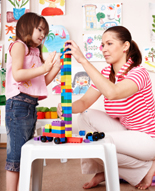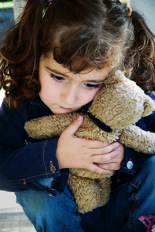
Introduction to Filial Therapy - Play Therapy In Filial Therapy it is parents who are trained to conduct child-centred play sessions with their children so they themselves are given the skills necessary to become the therapeutic facilitators of change. The broad principles of Play Therapy apply: play is an essential form of communication and healing for children, providing a medium through which the child can express difficult feelings and work through challenging experiences in the presence of a trusted adult. Filial Therapy combines family and Play Therapy principles and techniques and is structured to enhance the parent child relationship. It is a well researched and empirically validated intervention in which parents learn how to create a non-judgmental and accepting understanding relationship with their children through play sessions conducted in the home. Unlike conventional Play Therapy, parents are fully involved. It confirms the parents as the most important people in their child's healing and development. Sessions with the parent provide a creative therapeutic process through which the child can safely rework experiences and issues that have influenced and continue to affect the child and sometimes the whole family. back to menuCan parents really learn therapeutic skills? Yes. In fact, when parents conduct the sessions the therapeutic impact is enhanced and accelerated because the therapy is delivered by someone who is already a key person in the child's life, and in so doing this central relationship is powerfully strengthened. Parents are taught to apply important skills like limit setting and empathic listening during these play sessions, and in time these skills can become generalised to everyday situations so that both parent and child can enjoy a more positive relationship, and the child1s challenging behaviour diminishes accordingly. Many parents find that the time spent training in this method and in carrying out the weekly sessions is more than compensated by the time and energy saved in dealing with the difficult or challenging behaviour. As the parent helps the child achieve change, mastery, and growth, the relationship between the parent and child also experiences enhanced sensitivity, growth and change. And as the research bears out, the effects are long lasting and far reaching within the family system. back to menuWhy Filial Therapy Filial Therapy has achieved successful outcomes with many child and family difficulties such as challenging behaviour, anxiety, depression, relationship difficulties, chronic illness and traumatic events among others. For children who are adopted or fostered Filial Therapy has helped parents and carers communicate to the children in their care their willingness and ability to help them manage difficult feelings in relation to their experience of abuse and neglect. Children who are experiencing stressful situations at home and challenges in other social settings can also be more vulnerable than other children and may display a range of social, emotional and behavioural difficulties. Their increased vulnerability can cause the child to become unable to engage in positive peer relationships and their behaviour can become characterised by either internalising (withdrawal, sadness, isolation) or externalising ( anger, aggression, lashing out) symptoms. Parents often recognise the need their child has for therapeutic relationships to help them share painful experiences and develop closer attachment relationships. Therapeutic models in which an exclusive relationship between the child and a therapist develops can sometimes leave the parent feeling marginalised and excluded. When children feel understood and accepted at home they can feel empowered to manage challenges outside the home. back to menuAims Filial Therapy aims to support families who recognise that their child may have social or emotional difficulties often accompanied by challenging behaviour by helping address the conflicts that contribute to difficulties within the parent-child relationship. Such difficulties can leave parents feeling inadequate and out of control. By providing parents with the therapeutic skills to help children address the big feelings underlying their challenging behaviours the experiences which are likely to have contributed to the child's poor functioning can be addressed and worked through within the context of the 'therapeutic' family. By training parents to acquire skills that enable them to grow in understanding and acceptance of the child as well as to sensitively and empathically respond to the child's communications a context is created in which the child's fears and anxieties related to earlier experience can be safely explored and expressed within a new special parent-child alliance. back to menuSuitable for who? Filial Therapy is suitable for one or two parent families, with children aged approximately 3 to 14 years old but can be used with younger and with older children. Where there are 2 parents in the family, both are encouraged to partake in the training so they can both carry out play sessions at home with the children. In this way
Filial Therapy is suitable for children who have a wide range of presenting difficulties. It is also suitable for children who are distressed or unsettled by their life changes without having specific diagnoses or problems. Filial Therapy can be used as a treatment for child and family problems or as a prevention and family enhancement intervention. Because it focuses on the positive aspects of what parents can do with children it is particularly beneficial for addressing difficulties associated with parental challenges and in this way contributes to the development of positive attachments in the whole family. back to menuThe method In Filial Therapy, therapist and parents engage a joint process of helping the child while the parent is supported at all times by the therapist who teaches the parents the principles and skills involved in non-directive Play Therapy. The therapist provides demonstrations (with the child), and role play with the parents to practice the skills but also is available for the parents as a safe base from which they can explore their relationship with their child. The emphasis is on positive reinforcement throughout the learning process, ensuring that parents feel confident and supported. Parents can be trained in groups which maximises the source of emotional support and which also provides the invaluable source of feedback as group members can offer each other comments and insights within the trusting atmosphere of the group. This can be of added benefit as parents gradually become more effective in responding to their child and empowered in their role as 'therapeutic' parents. However, families who choose to be trained individually benefit no less. A critical part of the method is that Filial Therapy does not only depend on the successful teaching of parents but that it also crucially attends to parents' feelings and needs for support. back to menuEmpowering parents and children Play is a child’s language and offers the child a safe environment in which to express themselves.
Outcomes The main aim of Filial Therapy is to promote good mental health in children and to strengthen family relationships. Filial aims to see the following outcomes achieved with many of the children and their families:
What parents trained in Filial Therapy have said The children definitely express their feelings more but fear expressions have gone. They seem much more fearless and relaxed about life in general. They feel more confident and definitely less stressed. A great improvement. We are a much more harmonious household and much less disruption. It has definitely made us understand each child better and why they were displaying those worrying attitudes. It has made us conscious that everything does not have to be so perfect all the time, even parents are allowed to have feelings and get it wrong sometimes. My son's behaviour has changed and he accepts responsibility around his behaviour. My child is now willing to tell me what upsets him. My daughter now is able to reflect about an incident and says how she could have handled it differently. Great improvement in school as their behaviour has changed. They are more mature, no longer prone to outbursts and they are quicker to resolve difficulties. The therapist was very helpful, not just for the children but for us too. We trusted her and felt we could tell her everything without being judged. Just emptying our bag to her would make us feel better immediately. A very important message was that I could take it. When you take therapy out of the home it's over there but when children come home it spills out everywhere. By having the sessions here with me there was a real sense of containment. It was as if I was saying look you can have all your rubbish and you can have it here and we can contain it here' (foster carer). I feel I got a lot closer now to knowing who these children are and how deeply troubled they are. But I suddenly saw their ability to overcome their darkest moments with my help. The fact that they could play it out. (foster carer). They could do it with me, in this relationship and it was important that I showed them that I could cope.
Also see www.playandfilialtherapy.co.uk |
|



